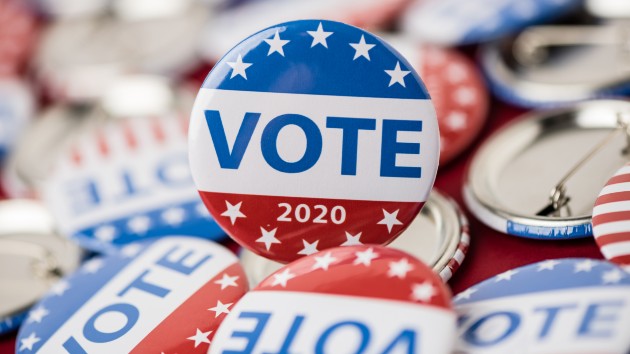By OLIVIA RUBIN, ABC News(WASHINGTON) — In one of the most crucial battleground states in the country, Democrats have prevailed in a series of critical court fights aimed at increasing ballot access in population-rich Philadelphia.Last week, the Pennsylvania Supreme Court ruled on a series of measures that would effectively expand vote-by-mail opportunities. Ballots were given an extra three days after Election Day to arrive at election offices and still be counted. Officials are no longer allowed to immediately reject ballots if they think the signature does not match. And voters can now use drop boxes to return their ballots.The rulings were among a series of successful court fights Democrats have had in dozens of states, which could potentially create a narrow but critical edge in the 2020 election.Ed Rendell, the former governor of Pennsylvania and former chairman of the national Democratic Party, told ABC News the rulings were critical in their ability to expand voting access in the midst of the COVID-19 pandemic, and said they would have a positive effect for Democrats, who use mail-in-voting more than Republicans do. Rendell said the Pennsylvania Supreme Court decision was backed up by “the facts and the law, and it was made with the idea to make it easier to vote.””Shame on anybody who wants to keep a system in place that makes it harder for people to vote,” Rendell said.The fight in Pennsylvania is far from settled. A lawyer for the Trump campaign told ABC News they are prepared to appeal up to the U.S Supreme Court, if necessary. The attacks on the vote-by-mail system and the changes to requirements and deadline can have a dizzying effect on voters who need or want to utilize the system this election season as the coronavirus pandemic continues, and could cause distrust in the system. According to a recent ABC News/Washington Post poll, 49% of registered voters see voting by mail as vulnerable to significant levels of fraud, even though there is no evidence to support it.As tensions over mail-in-ballots rage and dozens of lawsuits from both parties over election laws make their way through courts across the country, the intense legal battle in Pennsylvania is seen as crucial to the election. A new FiveThirtyEight analysis ranked Pennsylvania as possibly “the single most important state of the presidential election” with a 31% chance of being the tipping point state that clinches a victory for either President Donald Trump or former Vice President Joe Biden.The latest Monmouth Poll in Pennsylvania from Sept. 2 showed a tight race: Biden leads Trump by just 4 points in the state among all registered voters, a slim margin that narrows even more among likely voters to just 1 to 3 points, depending on turnout.Democrats have seen successes in courtrooms elsewhere as well.A Georgia court issued a ruling last month extending the deadline for ballots to arrive at polling locations by three days. In Mississippi, a judge ruled on Sept. 2 that voters with underlying medical conditions would be allowed to vote absentee, according to the American Civil Liberties Union, reversing a statewide restriction. In Harris County, Texas, a judge ruled officials can send all voters mail-in ballot applications, a move that Trump has repeatedly decried. In Michigan, a judge last week extended the deadline that mail-in ballots can arrive by to after the election.And on Monday alone, Democrats notched two more wins: A judge in Nevada dismissed a Trump campaign lawsuit challenging the state’s effort to send every voter an application for an absentee ballot, and a Wisconsin judge gave ballots almost an extra week to arrive as long as they are postmarked by Election Day.And on Saturday, just one day after the Pennsylvania ruling, a South Carolina court struck down the state’s witness requirement, which forces voters to have a separate witness sign their ballots. It was the party’s “fifth victory for the week,” according to Democratic Party attorney Marc Elias.”After today’s string of decisions, we are down to 31 pending lawsuits in 16 states–all of which need to be decided by November,” Marc Elias, a Democratic lawyer, tweeted Friday after the Pennsylvania ruling. “It is going to be a very busy few weeks.”A Republican National Committee spokesperson pushed back on the idea that Democrats had been gaining an election edge through court actions, noting that numerous decisions had come from what they called “friendly” courts and betting on a win in an appeal.”Many of their ‘wins’ have relied on half-hearted defenses from politically motivated state officials,” the spokesperson said.Matthew Morgan, Trump campaign general counsel, told ABC News that Republicans are also seeing decisions that they consider important to their efforts. Morgan pointed to a ruling in Pennsylvania last week in which the court blocked third-parties from delivering ballots on behalf of voters, or so called “ballot harvesting,” an issue central to Republican’s concerns over mail-in voting.According to Democracy Docket, a platform that tracks election-related litigation around the country, election-related suits are still being litigated in critical battleground states including Florida, Michigan and Wisconsin.The Republican Party is involved in about 40 election-related lawsuits around the nation, according to an RNC spokesperson, and has committed to spending $20 million on litigation efforts.”Democrats are determined to remove every safeguard on absentee ballots that ensure the integrity of the process,” Republican National Committee Spokesperson Mandi Merritt told ABC News in a statement, “and the RNC will continue to intervene to hold Democrats accountable.”Alex Conant, a political consultant and longtime Republican communications strategist who most recently worked on Marco Rubio’s 2016 president campaign, said the outcome of these court battles could be critical.”The rules are being written as we are holding the election,” Conant said. “Depending on how you write the rules, it’s going to advantage one party over the other … If it’s a close election like it was in 2016, a couple thousand votes makes a huge election.”Copyright © 2020, ABC Audio. All rights reserved.












